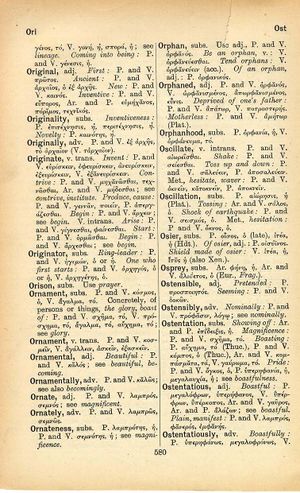ornate
Ὥσπερ αὐτοῦ τοῦ ἡλίου μὴ ὄντος καυστικοῦ, ἀλλ' οὔσης ζωτικῆς καὶ ζωοποιοῦ θέρμης ἐν αὐτῷ καὶ ἀπλήκτου, ὁ ἀὴρ παθητικῶς δέχεται τὸ ἀπ' αὐτοῦ ϕῶς καὶ καυστικῶς· οὕτως οὖν ἁρμονίας οὔσης ἐν αὐτοῖς τινὸς καὶ ἑτέρου εἴδους ϕωνῆς ἡμεῖς παθητικῶς ἀκούομεν → Just as although the Sun itself does not cause burning but has a heat in it that is life-giving, life-engendering, and mild, the air receives light from it by being affected and burned, so also although there is a certain harmony and a different kind of voice in them, we hear it by being affected.
English > Greek (Woodhouse)
adj.
P. and V. λαμπρός, σεμνός; see magnificent.
Latin > English (Lewis & Short)
ornātē: adv., v. orno,
I P. a. fin.
Latin > French (Gaffiot 2016)
ōrnātē¹² (ornatus), d’une manière ornée, avec élégance : Cic. de Or. 3, 53 ; Or. 22 ; ornatissime defendere causam, Cic. Br. 21, défendre une cause dans le style le plus orné, le plus élégant ; -tius Cic. de Or. 2, 35 ; Ac. 2, 129.
Latin > German (Georges)
ōrnātē, Adv. m. Compar. u. Superl. (1. ornatus), zierlich, mit Geschmack, geschmackvoll, facere, herrlich, Cic.: comparare magnifice et ornate convivium, Cic. – bes. als rhet. t. t., orn. loqui, dicere, Cic.: causas agere ornatius, Cic.: causam ornatissume et copiosissume defendere, Cic. Brut 21.

